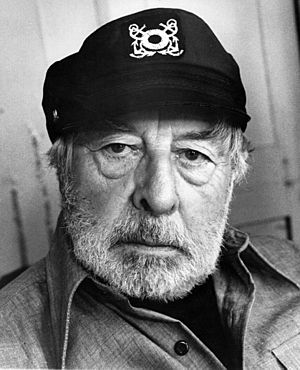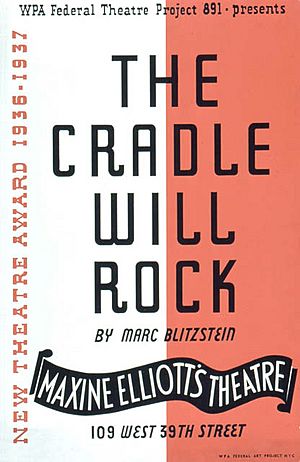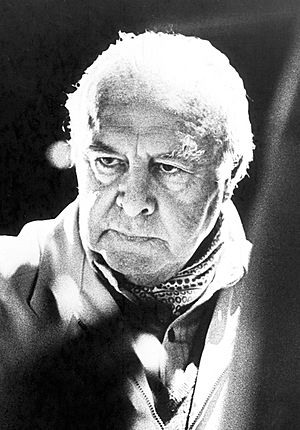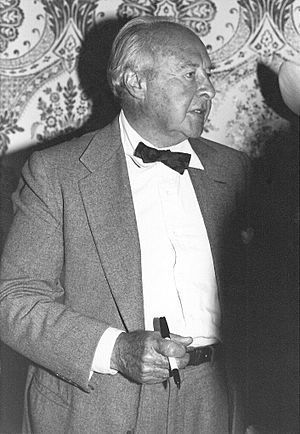John Houseman facts for kids
Quick facts for kids
John Houseman
|
|
|---|---|

Houseman in The Fog
|
|
| Born |
Jacques Haussmann
September 22, 1902 |
| Died | October 31, 1988 (aged 86) Malibu, California, U.S.
|
| Education | Clifton College |
| Occupation | Actor, producer |
| Years active | 1930–1988 |
| Spouse(s) |
Joan Courtney
(m. 1952–1988) |
| Children | 2 |
John Houseman (born Jacques Haussmann; September 22, 1902 – October 31, 1988) was a famous actor and producer from Romania and Britain who also became an American citizen. He worked in theatre, movies, and television.
He was well-known for working with the director Orson Welles on projects like Citizen Kane. He also produced the movie The Blue Dahlia. Many people remember him best for playing Professor Charles W. Kingsfield in the film The Paper Chase (1973). For this role, he won an Academy Award for Best Supporting Actor. He played Professor Kingsfield again in the TV show based on the movie.
John Houseman was also famous for his TV commercials for a company called Smith Barney. He had a very clear and distinctive English accent because of his schooling in England.
Contents
Early Life and Beginnings
John Houseman was born Jacques Haussmann on September 22, 1902, in Bucharest, Romania. His mother was British, and his father was Jewish from Alsace.
He went to school in England at Clifton College. He became a British citizen and worked in the grain business in London. In 1925, he moved to the United States and started using the stage name John Houseman. He became an American citizen in 1943.
Theatre Work
Houseman started working in theatre after the 1929 stock market crash. Before that, he worked in the international grain markets.
He helped write plays like Three and One (1933). He also directed several plays, including Four Saints in Three Acts (1934) with composer Virgil Thomson.
Working with Orson Welles
In 1934, Houseman was looking for an actor for his play Panic. This play was about a businessman who loses everything in the stock market crash. Houseman really wanted a young actor named Orson Welles for the main role, even though Welles was much younger than the character. Welles agreed to join the play.
Panic opened in March 1935. Even though it only ran for three performances, it brought Houseman and Welles together. Houseman said Welles was the teacher, and he was the student. Their partnership was very creative but also had many disagreements.
Federal Theatre Project
In 1936, the Federal Theatre Project was created by the government to help unemployed theatre workers. John Houseman helped lead the Negro Theatre Unit of this project.
Macbeth (1936)
Houseman hired Orson Welles to direct Macbeth for the Negro Theatre Unit. This production became known as the "Voodoo Macbeth" because it was set in Haiti and featured voodoo witch doctors. It was a huge success and was sold out every night.
Houseman and Welles also worked on other plays together, like Tragical History of Dr. Faustus (1936).
The Cradle Will Rock (1937)
In June 1937, Houseman and Welles produced a very controversial musical called The Cradle Will Rock. It was written by Marc Blitzstein and was about workers and unions. The government thought the show had strong political messages and tried to stop it from opening.
On opening night, the performers were told they couldn't go on stage. So, the cast and audience walked 20 blocks to another theatre. There, the composer, Marc Blitzstein, started playing the music on the piano. One by one, the actors stood up in the audience and sang their parts. This created a unique "oratorio" version of the show. This event was very successful and became legendary. However, it also led to Houseman being fired and Welles leaving the project.
Mercury Theatre
After leaving the Federal Theatre Project, Houseman and Welles continued to produce The Cradle Will Rock independently. In 1937, they also started their own theatre company called the Mercury Theatre.
Their goal was to find new talent, try out new types of plays, and make theatre available to more people. They put on several important productions, including a modern version of Julius Caesar. Houseman said using modern clothes helped show how the play related to current events.
They also presented plays like The Shoemaker's Holiday (1938) and Heartbreak House (1938).
Radio Shows
In 1938, the Mercury Theatre started a weekly radio show on CBS called The Mercury Theatre on the Air. Houseman worked on the scripts.
"The War of the Worlds" (1938)
The radio show became very famous for its 1938 adaptation of H. G. Wells' book The War of the Worlds. This broadcast caused a huge panic across the country because many listeners thought a real alien invasion was happening. Welles was surprised by the panic. Houseman said Welles "hadn't the faintest idea what the effect would be."
Film Producer
Citizen Kane (1941)
John Houseman and Orson Welles continued their partnership in Hollywood. In 1939, Welles got a deal with RKO studios to make two movies, with Welles having full creative control.
Welles first thought about adapting Heart of Darkness. However, there were problems with the budget and filming didn't start. Welles and Houseman had a big argument, which ended their partnership and friendship for a while.
Later, Houseman played an important part in making Citizen Kane (1941), which starred Welles. Welles called Houseman and asked him to help the screenwriter, Herman J. Mankiewicz, finish the script. Houseman agreed. While Welles took credit for the screenplay, Houseman believed the credit belonged to Mankiewicz. This disagreement led to a final break between Houseman and Welles. Houseman did take some credit for helping shape the story and editing the script.
Working in Hollywood
After his work with Welles, Houseman directed plays and produced the stage version of Native Son (1941).
In Hollywood, he became a vice-president at David O. Selznick Productions. He helped produce the movie Jane Eyre (1943), which starred Joan Fontaine and Orson Welles.
During World War II, Houseman became the head of the overseas radio division for the Office of War Information. He worked for the Voice of America.
In 1945, Houseman signed a contract with Paramount Pictures to produce movies. He produced The Unseen (1945) and The Blue Dahlia (1946), which starred Alan Ladd and was written by Raymond Chandler. The Blue Dahlia is now considered a classic film.
He later produced movies for other studios like Universal and RKO, including Letter from an Unknown Woman (1948) and They Live by Night (1948).
Working at MGM
When Dore Schary became the head of production at MGM, he offered Houseman a contract, which Houseman accepted.
At MGM, Houseman had a huge success with The Bad and the Beautiful (1952). He also produced the film version of Julius Caesar (1953), which was nominated for an Academy Award for Best Picture.
Other popular films he produced included Executive Suite (1954). He also produced Lust for Life (1956), a movie about the artist Vincent van Gogh, which was praised by critics.
Television and Teaching
Houseman started producing for television, working on shows like The Seven Lively Arts (1957) and Playhouse 90.
The Juilliard School and The Acting Company
In 1968, John Houseman became the first director of the Drama Division at The Juilliard School, a famous performing arts school. He stayed in this role until 1976. Many talented actors studied under him, including Kevin Kline, Patti LuPone, Christopher Reeve, Mandy Patinkin, and Robin Williams.
When his first class graduated in 1972, Houseman and his colleague Margot Harley created a touring theatre group for them. This group was first called the "Group 1 Acting Company" and later became The Acting Company. Houseman was its artistic director until 1986. This company has been active for over 40 years and is known as a major classical theatre company in the United States.
Houseman continued to be involved in theatre, directing and producing many plays. In 1979, he was honored by being inducted into the American Theater Hall of Fame.
Acting Career
John Houseman had acted a little earlier in his career, including a small but important part in Seven Days in May (1964).
He became widely known to the public for his role as Professor Charles Kingsfield in the film The Paper Chase (1973). He won a Golden Globe and an Academy Award for this role. This movie launched his unexpected late career as a character actor.
He appeared in other films like Rollerball (1975) and Three Days of the Condor (1975).
Houseman also appeared in many TV shows, including The Adams Chronicles (1976) and The Bionic Woman (1976).
He continued acting in films such as The Cheap Detective (1978), John Carpenter's The Fog (1980), and My Bodyguard (1981).
Television Star
After playing a law professor in The Paper Chase movie, he played the same role in a TV series of the same name. The show ran from 1978 to 1986, and he received two Golden Globe nominations for his acting.
In the 1980s, Houseman became even more famous for playing the grandfather Edward Stratton II in the TV show Silver Spoons. He was also well-known for his commercials for the brokerage firm Smith Barney, where he famously said, "They make money the old fashioned way... they earn it."
He played the Jewish author Aaron Jastrow in the highly praised 1983 miniseries The Winds of War, which earned him another Golden Globe nomination.
Final Years and Death
John Houseman continued to act in films like Bright Lights, Big City (1988) and Another Woman (1988).
In 1988, he had his last two acting roles in the films The Naked Gun: From the Files of Police Squad! and Scrooged. Both movies were released after he passed away.
John Houseman died on October 31, 1988, at the age of 86, from spinal cancer at his home in Malibu, California. His body was cremated, and his ashes were scattered at sea.
Filmography
As Actor (Film)
| Year | Title | Role | Director | Notes |
|---|---|---|---|---|
| 1938 | Too Much Johnson | Duelist/Keystone Cop | Orson Welles | Also producer |
| 1964 | Seven Days in May | Vice-Adm. Farley C. Barnswell | John Frankenheimer | Uncredited |
| 1973 | The Paper Chase | Charles W. Kingsfield Jr. | James Bridges | Academy Award for Best Supporting Actor Golden Globe Award for Best Supporting Actor - Motion Picture National Board of Review Award for Best Supporting Actor |
| 1975 | Rollerball | Mr. Bartholomew | Norman Jewison | |
| Three Days of the Condor | Wabash | Sydney Pollack | ||
| 1976 | St. Ives | Abner Procane | J. Lee Thompson | |
| 1978 | The Cheap Detective | Jasper Blubber | Robert Moore | |
| 1979 | Old Boyfriends | Dr. Hoffman | Joan Tewkesbury | |
| 1980 | The Fog | Mr. Machen | John Carpenter | |
| Wholly Moses! | The Archangel | Gary Weis | ||
| My Bodyguard | Mr. Dobbs | Tony Bill | ||
| 1981 | Ghost Story | Sears James | John Irvin | |
| 1982 | Murder by Phone | Stanley Markowitz | Michael Anderson | |
| 1983 | A Rose for Emily | Narrator (voice) | Lyndon Chubbuck | Short film |
| 1988 | Bright Lights, Big City | Mr. Vogel | James Bridges | |
| Another Woman | Mr. Post | Woody Allen | ||
| Scrooged | Himself | Richard Donner | Cameo; released after his death | |
| The Naked Gun: From the Files of Police Squad! | Driving Instructor | David Zucker | Uncredited cameo; released after his death |
As Producer (Film)
| Year | Title | Director | Notes |
|---|---|---|---|
| 1938 | Too Much Johnson | Orson Welles | |
| 1945 | The Unseen | Lewis Allen | As associate producer |
| 1946 | Miss Susie Slagle's | John Berry | |
| The Blue Dahlia | George Marshall | ||
| 1948 | Letter from an Unknown Woman | Max Ophüls | |
| They Live by Night | Nicholas Ray | ||
| 1951 | The Company She Keeps | John Cromwell | |
| On Dangerous Ground | Nicholas Ray | ||
| 1952 | Holiday for Sinners | Gerald Mayer | |
| The Bad and the Beautiful | Vincente Minnelli | ||
| 1953 | Julius Caesar | Joseph L. Mankiewicz | Nominated – Academy Award for Best Picture |
| 1954 | Executive Suite | Robert Wise | |
| Her Twelve Men | Robert Z. Leonard | ||
| 1955 | The Cobweb | Vincente Minnelli | |
| Moonfleet | Fritz Lang | ||
| 1956 | Lust for Life | Vincente Minnelli | |
| 1962 | All Fall Down | John Frankenheimer | |
| Two Weeks in Another Town | Vincente Minnelli | ||
| 1963 | In the Cool of the Day | Robert Stevens | |
| 1966 | This Property Is Condemned | Sydney Pollack |
As Actor (Television)
| Year | Title | Role | Notes |
|---|---|---|---|
| 1975 | Great Performances | Dr. Fawcett | Episode: "Beyond the Horizon" |
| Fear on Trial | Mike Collins | Television film | |
| 1976 | The Adams Chronicles | Judge Richard Gridley | Miniseries; 1 episode |
| Truman at Potsdam | Winston Churchill | Television film | |
| Hazard's People | John Hazard | ||
| Six Characters in Search of an Author | The Director | ||
| The Six Million Dollar Man | Dr. Lee Franklin | Episode: "Kill Oscar: Part 2" | |
| The Bionic Woman | 2 episodes | ||
| Captains and the Kings | Judge Newell Chisholm | Miniseries; 2 episodes | |
| 1977 | The American Short Story | Father Flynn | Episode: "The Displaced Person" |
| Washington: Behind Closed Doors | Myron Dunn | Miniseries; 6 episodes | |
| The Best of Families | Himself (Host) | Miniseries | |
| Aspen | Joseph Merrill Drummond | Miniseries; 2 episodes | |
| 1978–86 | The Paper Chase | Charles W. Kingsfield Jr. | Main cast; Seasons 1–4 Nominated – CableACE Award for Best Actor in a Dramatic Presentation Nominated – Golden Globe Award for Best Actor – Television Series Drama |
| 1979 | The Last Convertible | Dr. Wetherell | Miniseries; 3 episodes |
| The French Atlantic Affair | Dr. Archady Clemens | ||
| 1980 | The Associates | Professor Kingsfield | Episode: "Eliot's Revenge" |
| Gideon's Trumpet | Earl Warren | Television film | |
| The Babysitter | Dr. Lindquist | ||
| A Christmas Without Snow | Ephraim Adams | ||
| 1982 | Mork & Mindy | Milt | Episode: "Mork, Mindy, and Mearth Meet MILT" |
| Marco Polo | Patriarch of Aquileia | Miniseries; 1 episode | |
| 1982–87 | Silver Spoons | Edward Stratton Jr. | Recurring role; Seasons 1–5 |
| 1983 | American Playhouse | Network Newscaster | Episode: "Network Newscaster" |
| The Winds of War | Aaron Jastrow | Miniseries; 7 episodes Nominated – Golden Globe Award for Best Supporting Actor – Series, Miniseries or Television Film |
|
| Freedom to Speak | Benjamin Franklin | Miniseries; 3 episodes | |
| 1985 | A.D. | Gamaliel | Miniseries; 5 episodes |
| 1988 | Noble House | Sir Geoffrey Allison | Miniseries; 4 episodes |
| Lincoln | Gen. Winfield Scott | Miniseries; 2 episodes | |
| 227 | John Houseman, himself | Episode: "They're Playing Our Song" |
As Producer (Television)
| Year | Title | Notes |
|---|---|---|
| 1957–58 | The Seven Lively Arts | 10 episodes |
| 1958–59 | Playhouse 90 | 7 episodes |
| 1960 | Dillinger | Television film |
| 1963 | The Great Adventure | 3 episodes |
| 1966 | ABC Stage 67 | Episode: "Evening Primrose" |
| 1980 | Gideon's Trumpet | Television film Nominated – Primetime Emmy Award for Outstanding Television Movie |
| 1983 | Choices of the Heart | Television film |
Images for kids
See also
 In Spanish: John Houseman para niños
In Spanish: John Houseman para niños
 | Georgia Louise Harris Brown |
 | Julian Abele |
 | Norma Merrick Sklarek |
 | William Sidney Pittman |








